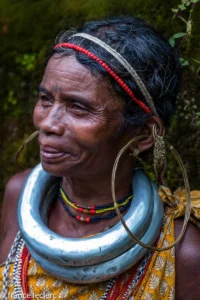
Context
- The Rajya Sabha has taken a noteworthy step forward by passing legislation that seek to add Odisha and Andhra Pradesh’s Particularly Vulnerable Tribal Groups (PVTGs) to the Scheduled Tribes (ST) lists.
- The socioeconomic advancement and empowerment of these neglected populations greatly depend on this action. Let us examine these bills’ specifics and ramifications in more depth.
Background on Particularly Vulnerable Tribal Groups : Inclusion Efforts in Odisha and Andhra Pradesh
- One of the most vulnerable and oppressed communities in India is the Particularly Vulnerable Tribal Groups (PVTGs), commonly referred to as “Adivasis” or “Scheduled Tribes.”
- They deal with a number of socioeconomic issues, such as land alienation, poverty, and limited access to healthcare and education.
- Various welfare measures and affirmative action programs have been launched by the government in recognition of the need to address the unique needs of these groups.
The Bills
- The Rajya Sabha passed legislation that aim to add particular
- Particularly Vulnerable Tribal Groups from Andhra Pradesh and Odisha to the ST lists.
- These communities will become entitled to a range of government-provided rights, benefits, and protections under the current ST welfare programs and provisions as a result of their inclusion.
- It’s a big step in making sure these underprivileged populations are empowered and their socioeconomic status is improved.
Implications
These PVTGs’ presence in the ST lists has the following effects:
- Access to Welfare Programs: People living in these communities will now be able to take use of a number of programs and welfare schemes created especially for Scheduled Tribes. This covers programs pertaining to work, housing, healthcare, and education.
- Land and Forest Rights: Tribal people’ livelihoods depend heavily on their rights to land and forest resources, which are protected by their ST status. Their rights to land tenure are strengthened, and their capacity to safeguard and manage natural resources sustainably is improved, by being included in the ST lists.
- Political Representation: These communities benefit from increased political representation as a result of their ST status, which makes it possible for them to more actively engage in the democratic process and defend their rights and interests.
Way Forward
- Although the passing of these acts is a good thing, it is crucial to make sure that welfare programs and schemes aimed at PVTGs are implemented and monitored effectively.
- The core causes of these communities’ marginalization and vulnerability, including as land alienation, displacement, and lack of access to essential services, should be the government’s primary emphasis.
- To sum up, the addition of Odisha and Andhra Pradesh’s Particularly Vulnerable Tribal Groups to the ST lists is a critical turning point in the direction of social justice and inclusive development.
- It displays the government’s dedication to uplifting underprivileged areas and guaranteeing their complete involvement in the process of development.
- However, ongoing efforts are required to address the various issues these communities face and provide them with the tools they need to life honorable.
FAQs
Q1: What are Tribal Groups That Are Particularly Vulnerable (PVTGs)?
Ans: Communities within Scheduled Tribes that are determined to be the most marginalized and vulnerable because of a variety of socioeconomic issues are known as Particularly Vulnerable Tribal Groups (PVTGs).
Q2: What is the significance of PVTGs being listed among Scheduled Tribes (ST)?
Ans: PVTGs are granted access to a range of rights, privileges, and safeguards under current welfare programs and provisions intended for Scheduled Tribes as a result of their inclusion on the ST lists. It supports their empowerment and growth and aids in addressing their unique socioeconomic demands.
Q3: In terms of land and forest rights, how do PVTGs gain from ST status?
Ans: PVTGs’ land tenure rights are strengthened by ST designation, and it also improves their capacity to safeguard and manage land and forest resources sustainably—both of which are essential to their way of life. It preserves their traditional way of life by giving them rights and safeguards over land and forest resources.
Q4: How does the Rajya Sabha function within the legislative branch?
Ans: One of the two houses of the Indian Parliament is the Rajya Sabha, often known as the Council of States. Its main responsibility in the legislative process is to advocate the interests of the states and union territories. It examines and evaluates laws enacted by the House of People, or Lok Sabha, and offers
Q5: How important is the Rajya Sabha’s involvement in approving legislation for PVTGs (partially vulnerable tribal groups)?
Ans: The Rajya Sabha, which represents the interests of states and union territories, is integral to the passage of legislation concerning Particularly Vulnerable Tribal Groups (PVTGs). Its adoption guarantees that the legislative process takes into consideration the issues and viewpoints of many groups and areas.
Q6: What is the Rajya Sabha’s role in promoting inclusion in India’s legislative process?
Ans: States and union territories have a forum to express their thoughts and worries about matters of national importance through the Rajya Sabha. Its members support inclusivity and federalism in the legislative process by representing a wide range of areas, communities, and interests.